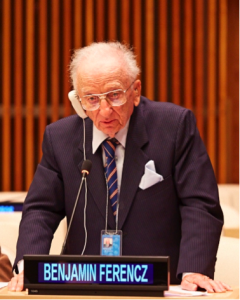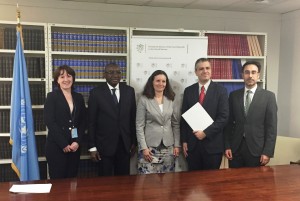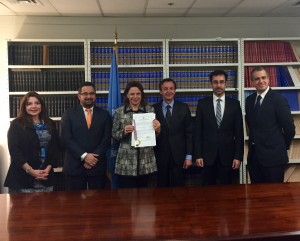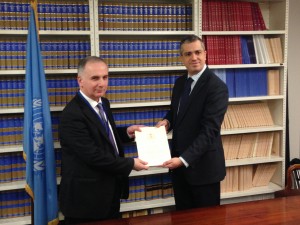

Our purpose: Promoting peace through criminal justice – preventing crimes of aggression
Through the United Nations Charter, States have expressed their commitment “to save succeeding generations from the scourge of war”. They have agreed to renounce the illegal threat or use of force, and to settle their disputes “by peaceful means in such a manner that international peace and security, and justice, are not endangered”. States have the legal duty to abide by this commitment and the UN Security Council has the primary responsibility to enforce it.The Nuremberg Trials made it clear that criminal justice also has an important role to play for the promotion of peace and the deterrence of acts of aggression – though it remained limited and theoretical for many decades thereafter. With the 2010 Kampala amendments to the Rome Statute of the International Criminal Court, States Parties created a new mechanism to enforce the most important rule of international law: the prohibition of the illegal use of force under the United Nations Charter. This website is dedicated to making accountability a reality.
News
 In the Nuremberg Spirit, Donald M. Ferencz calls for ratification of the Kampala Amendments: Writing on the crime of aggression, deterrence and the International Criminal Court, Donald M. Ferencz, Convenor of the Global Institute for the Prevention of Aggression, called on States to ratify the Kampala Amendments on the crime of aggression. This would serve to build on the historic legal precedent established at Nuremberg and on their pledge to save succeeding generations from the scourge of war.
In the Nuremberg Spirit, Donald M. Ferencz calls for ratification of the Kampala Amendments: Writing on the crime of aggression, deterrence and the International Criminal Court, Donald M. Ferencz, Convenor of the Global Institute for the Prevention of Aggression, called on States to ratify the Kampala Amendments on the crime of aggression. This would serve to build on the historic legal precedent established at Nuremberg and on their pledge to save succeeding generations from the scourge of war.
Read the full article on the Website of the Institute for 21st Century Questions.
 70th Anniversary of VE Day, 3rd anniversary of the first ratification of the Kampala Amendments: 70 years ago today, Nazi Germany surrendered unconditionally, marking the end of the Second World War in Europe. The aftermath of this war that caused untold suffering amongst millions saw the creation of the Nuremberg and Tokyo Tribunals – the only international courts so far empowered to try individuals for the crime of aggression. While the following decades saw the prohibition of the illegal use of force cemented into international law in the Charter of the United Nations, no international court has been able to hold transgressors to account. The Kampala Amendments on the crime of aggression present a historic opportunity to change that, to allow the International Criminal Court to adjudge those most responsible for the most serious illegal uses of force. Three years ago, Liechtenstein became the first State to ratify the Kampala Amendments on the crime of aggression. As of today, 23 States have ratified the amendments, paving the way for their activation in 2017. Let us honor all victims of aggressive war by making this a reality.
70th Anniversary of VE Day, 3rd anniversary of the first ratification of the Kampala Amendments: 70 years ago today, Nazi Germany surrendered unconditionally, marking the end of the Second World War in Europe. The aftermath of this war that caused untold suffering amongst millions saw the creation of the Nuremberg and Tokyo Tribunals – the only international courts so far empowered to try individuals for the crime of aggression. While the following decades saw the prohibition of the illegal use of force cemented into international law in the Charter of the United Nations, no international court has been able to hold transgressors to account. The Kampala Amendments on the crime of aggression present a historic opportunity to change that, to allow the International Criminal Court to adjudge those most responsible for the most serious illegal uses of force. Three years ago, Liechtenstein became the first State to ratify the Kampala Amendments on the crime of aggression. As of today, 23 States have ratified the amendments, paving the way for their activation in 2017. Let us honor all victims of aggressive war by making this a reality.
Photo: War devastates the city of Warsaw, World War II
 Second Benjamin B. Ferencz Essay Competition now accepting entries: All comers are invited to reflect on the relationship between jus ad bellum and jus in bello in the context of modern war crimes trials. Expressions of intent to participate are invited by 15 May. The winning essay will win $10,000, with $2,500 for the second and third placed entries. The competition is hosted by Prof. Michael Scharf, member of the Global Institute for the Prevention of Aggression’s Council of Advisers. Further details are available on the website of the Frederick K. Cox International Law Center. The inaugural essay competition addressed the question of the illegal use of force as a crime against humanity.
Second Benjamin B. Ferencz Essay Competition now accepting entries: All comers are invited to reflect on the relationship between jus ad bellum and jus in bello in the context of modern war crimes trials. Expressions of intent to participate are invited by 15 May. The winning essay will win $10,000, with $2,500 for the second and third placed entries. The competition is hosted by Prof. Michael Scharf, member of the Global Institute for the Prevention of Aggression’s Council of Advisers. Further details are available on the website of the Frederick K. Cox International Law Center. The inaugural essay competition addressed the question of the illegal use of force as a crime against humanity.
 Swiss parliament approves ratification of the Kampala Amendments: On 20 March, the Swiss Federal Assembly unanimously approved the ratification of the Kampala Amendments. Ratification had previously been recommended by both the upper and the lower chambers of the Federal Assembly on 27 November 2014 and 9 March 2015, respectively. Switzerland thus remains on track to deposit its instrument of ratification in summer 2015.
Swiss parliament approves ratification of the Kampala Amendments: On 20 March, the Swiss Federal Assembly unanimously approved the ratification of the Kampala Amendments. Ratification had previously been recommended by both the upper and the lower chambers of the Federal Assembly on 27 November 2014 and 9 March 2015, respectively. Switzerland thus remains on track to deposit its instrument of ratification in summer 2015.
You can track the Kampala Amendments’ progress through the Federal Assembly in German and French.
 Czech Republic 23rd State to ratify Kampala Amendments: On 12 March 2015, Edita Hrdá, Permanent Representative of the Czech Republic deposited her country’s instrument of ratification of the Kampala Amendments. Sidiki Kaba, President of the Assembly of States Parties to the Rome Statute witnessed the event. The Eastern European region continues its leadership role in the ratification of the Kampala Amendments: 8 of the 18 Eastern European States Parties have now ratified the amendments, with the remainder having pledged to do so soon. With several domestic ratification processes nearing completion, we remain on track to achieve the milestone of 30 ratifications in the first half of 2015.
Czech Republic 23rd State to ratify Kampala Amendments: On 12 March 2015, Edita Hrdá, Permanent Representative of the Czech Republic deposited her country’s instrument of ratification of the Kampala Amendments. Sidiki Kaba, President of the Assembly of States Parties to the Rome Statute witnessed the event. The Eastern European region continues its leadership role in the ratification of the Kampala Amendments: 8 of the 18 Eastern European States Parties have now ratified the amendments, with the remainder having pledged to do so soon. With several domestic ratification processes nearing completion, we remain on track to achieve the milestone of 30 ratifications in the first half of 2015.
- You can read ASP President Kaba’s statement here.
Photo (from left to right): Petra Benešová (Mission of the Czech Republic to the UN), Sidiki Kaba (President of the ICC Assembly of States Parties), Edita Hrdá (Permanent Representative of the Czech Republic to the UN), Santiago Villalpando (Head, UN Treaty Section) and Stefan Barriga (Deputy Permanent Representative of Liechtenstein to the UN).
 Wave of ratifications continues as Costa Rica becomes 22nd State Party to Kampala Amendments: On 5 February 2015, the Vice President of Costa Rica, Ms. Ana Helena Chacón Echeverría, deposited her country’s instrument of ratification of the Kampala Amendments. Costa Rica became the 22nd State Party to ratify the amendments overall and the second in as many weeks. The Latin American region played a crucial role in negotiation of the crime of aggression amendments; many States Parties from the region are expected to ratify the amendments in the near future. We remain confident that the threshold of 30 ratifications needed for the activation of the amendments on the crime of aggression will be reached well before the end of 2015.
Wave of ratifications continues as Costa Rica becomes 22nd State Party to Kampala Amendments: On 5 February 2015, the Vice President of Costa Rica, Ms. Ana Helena Chacón Echeverría, deposited her country’s instrument of ratification of the Kampala Amendments. Costa Rica became the 22nd State Party to ratify the amendments overall and the second in as many weeks. The Latin American region played a crucial role in negotiation of the crime of aggression amendments; many States Parties from the region are expected to ratify the amendments in the near future. We remain confident that the threshold of 30 ratifications needed for the activation of the amendments on the crime of aggression will be reached well before the end of 2015.
Photo: (from left to right) Gina Guillen, Mission of Costa Rica; Amb. Juan Carlos Mendoza-Garcia, Ambassador of Costa Rica to the United Nations; Vice President Ana Helena Chacón Echeverría; Amb. Sebastiano Cardi, Vice President of the ICC’s Assembly of States Parties; Stefan Barriga, Deputy Permanent Representative of Liechtenstein to the UN; Santiago Villalpando, Head of the UN Treaty Section.
 First Kampala Amendment Ratification of 2015: Malta! On 29 January 2015, Malta deposited its instrument of ratification of the Kampala Amendments, becoming the 21st State Party to do so. Malta becomes the 13th Member State of the European Union to have ratified the amendments, with further EU Member States expected to ratify soon. Indeed, we remain confident that the threshold of 30 ratifications needed for the activation of the amendments on the crime of aggression will be reached well before the end of 2015. At least two more ratifications are expected during the next few weeks – stay tuned!
First Kampala Amendment Ratification of 2015: Malta! On 29 January 2015, Malta deposited its instrument of ratification of the Kampala Amendments, becoming the 21st State Party to do so. Malta becomes the 13th Member State of the European Union to have ratified the amendments, with further EU Member States expected to ratify soon. Indeed, we remain confident that the threshold of 30 ratifications needed for the activation of the amendments on the crime of aggression will be reached well before the end of 2015. At least two more ratifications are expected during the next few weeks – stay tuned!
Photo: Ambassador Grima depositing the instrument of ratification. Courtesy of UN
 Georgia 20th State to ratify Kampala Amendments: On 5 December 2014, Gocha Lordkipanidze, Deputy Minister of Justice of Georgia deposited his country’s instrument of ratification of the Kampala Amendments. The Eastern European region continues its leadership role in the ratification of the Kampala Amendments: 7 of the 18 Eastern European States Parties have now ratified the amendments, with the remainder having pledged to do so soon. With this 20th ratification, our campaign has reached the two-thirds point towards the goal of achieving 30 ratifications by the end of 2015, and thus allowing for the activation of the amendments in early 2017.
Georgia 20th State to ratify Kampala Amendments: On 5 December 2014, Gocha Lordkipanidze, Deputy Minister of Justice of Georgia deposited his country’s instrument of ratification of the Kampala Amendments. The Eastern European region continues its leadership role in the ratification of the Kampala Amendments: 7 of the 18 Eastern European States Parties have now ratified the amendments, with the remainder having pledged to do so soon. With this 20th ratification, our campaign has reached the two-thirds point towards the goal of achieving 30 ratifications by the end of 2015, and thus allowing for the activation of the amendments in early 2017.
Speaking at the ratification ceremony, Deputy Minister of Justice of Lordkipanidze said, “depositing the instrument of ratification is our contribution to setting stage for what the UN Secretary-General called ‘paradigm shift in international law and international relations.’ It constitutes a major effort by Georgia to build a global culture of individual criminal accountability for the commission of the crime of aggression through strengthening the ICC’s jurisdiction and facilitating the timely activation of the Kampala Amendments.”
At least one further ratification is expected during the course of the Assembly of States Parties, which starts on Monday, 8 December 2014. Follow our twitter feed @CrimeAggression for the latest updates.
